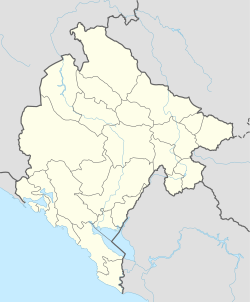Risan
|
Risan Рисан |
|
|---|---|
| Town | |
 |
|
| Coordinates: 42°30′53″N 18°41′42″E / 42.51472°N 18.69500°E | |
| Country |
|
| Municipality | Kotor Municipality |
| Population (2011) | |
| • Total | 2,048 |
| Time zone | CET (UTC+1) |
| • Summer (DST) | CEST (UTC+2) |
| Area code(s) | 032 |
| Vehicle registration | KO |
| Natural and Culturo-Historical Region of Kotor | |
|---|---|
| Name as inscribed on the World Heritage List | |
 |
|
| Location |
Montenegro (Not yet a State Party to the World Heritage Convention) |
| Type | Cultural |
| Criteria | i, ii, iii, iv |
| Reference | 125 |
| UNESCO region | Europe and North America |
| Inscription history | |
| Inscription | 1979 (3rd Session) |
| Extensions | 1979-2003 |
Risan (pronounced [rîsan], Serbian Cyrillic: Рисан, Albanian: Rizoni, Italian: Risano, Latin Rhizinium/Risinium, Curiate Italian Risinio) is a town in the Bay of Kotor, Montenegro. It traces its origins to the ancient settlement of Rhizon, the oldest settlement in the Bay of Kotor.
Lying in the innermost portion of the bay, the settlement was protected from the interior by inaccessible limestone cliffs of the Orjen mountain, the highest range of eastern Adriatic, and through several following narrow straits in the Bay of Kotor from the open sea.
While the Krivošije karst plateau that hangs steep above the narrow shores of Risan bay receives over 5000 mm rain annually (European record), several strong karst springs that form a short brook collect in the narrow cultivable belt at Risan.
The earliest mention of Rhizon dates back to the 4th century BCE, as the main fortress in the Illyrian state where Queen Teuta took refuge during the Illyrian Wars. The degree of Hellenization at Rhizon was very high. In Roman times, Rhizinium is documented as an oppidum civium Romanorum, and the most prosperous time for Roman Rhizinium came during the 1st and 2nd centuries, when huge villas were made in the area and the city had 10,000 inhabitants. Five mosaics are the most valuable remains of that period - not only for Risan but also for Montenegro.
...
Wikipedia

